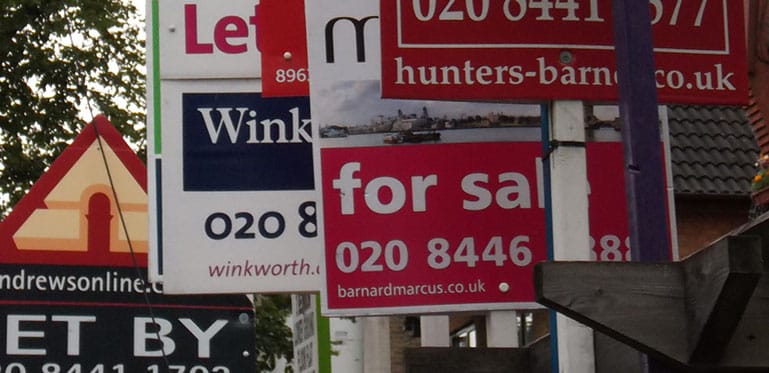Let’s face it, moving house shouldn’t be too complicated.
A seller has a home to sell, puts it on the market with an estate agent (or opts to sell their house online) who finds a buyer and they come along and purchase.
A month or two later, a moving date is set and everyone is happy in their new home. That’s the theory.
Unfortunately, partly because of the system that we work with legally (conveyancing) and partly because the value of the asset i.e. the house is so high in comparison with anything else that we buy; The complexity tends to spiral ever upward.
It’s not surprising that around a third of all sales agreed do not proceed.
First, watch our video with Jonathan Rolande for tips about choosing the right estate agent to sell your house, then check out the 5 things you might want to know about the business that many estate agents would perhaps prefer you didn’t.
Choosing The Right Estate Agent To Sell Your House
Jonathan Rolande talks about choosing the right estate agent to sell your house and tips on how to figure that out
Video Transcription
Choosing the estate agent to sell your property is a really, really important decision. The difference between a good and a bad agent, a right and a wrong one for you, could result in a sale or not or thousands of pounds of difference in price.
So, I think what you need to do is choose the kind of agent who deals with properties in your area, of your type.
So, if you’ve got a flat for sale, don’t bother going to the best estate agent in town who only deals with large detached houses and of course visa versa. It’s horses for courses with agents, that way you know that you’ll have the largest target of potential buyers for your property.
I think you need to make sure they’re on a property portal, be it Zoopla, Rightmove or OnTheMarket or preferably two out of those three. Because it’s not possible to be on all three at the same time, and also I think I would go into the agent themselves and register myself as a buyer.
I would then find out how they dealt with me, how keen they were, how friendly, how approachable and I would see their service through the eyes of my potential buyer, and that way you’re going to know whether they’re the kind of people that you could do business with.
You can also browse the internet, look at their websites, make sure that the website is kept well up to date. Are they, for example, blogging regularly, do they have social accounts such as; Facebook and Twitter. Those are great ways to find potential buyers and publicise your home. If they’re not on those sorts of medium then they’re probably not the right agent for you.
But, most importantly, a successful agent dealing with the kind of property you have and someone that you can do business with. They need to be friendly, honest and upfront.
Remember this is a very important transaction for you, it’s probably going to go on for some months and you want someone that you know speaks your language.
5 Things Estate Agents Hope You Don’t Know
Estate agents have their critics, but they do a valuable task to sell your house, usually on a no sale no fee basis and whilst some do very well with minimal effort, most High Street estate agents work ethically and hard for their clients.
How Do They Value and Sell Your House?

There is no science to this despite what many will lead you to believe.
The property quite simply is worth somebody would pay and the estate agent will give his best estimate on this figure based upon comparable properties that have sold in the area and also those that have not.
Using their skill and judgement they will come up with a suitable price, and then probably add 5% or 10% to ensure that they secure the instructions for themselves.
This is why we would always advise sellers to obtain three valuations to see if there are any wide variances, around 5% or so either way is acceptable.
After all, we have already said it is a not a science, but any more than this and you should be raising an eyebrow.
Estate agents also use many tools available only to them such as private areas of property portals that give statistics on demand, previous sale prices, length of time on market of similar property, etc.
Unfortunately, nothing quite as robust as this is available in one place for sellers, but you can check at Zoopla which will give you a pretty accurate valuation that you can then compare your agents to.
If you choose your agent wisely you should of course listen to their advice but beware of anybody who is too definite. Any estate agent who says that your home is worth £190,000 and definitely not £195,000 probably does not know what they’re talking about.
How could they possibly know whether there is a potential buyer out there who will pay another 2% or so?
A good agent will give you their view then discuss your requirements such as the reason for sale, speed required, etc. and try and tailor the price to that.
Why Do Estate Agents Charge In Percentages, Not Pounds?

This is probably tradition. Estate agents have always charged between 1.5% and 2% and there is also the view that a percentage means that the higher the price achieved, the higher the commission for the agent.
Conversely, if the price has to be reduced, the agent’s charge also reduces in line with that. In reality because we are only talking about a small percentage of any potential difference, normally for example 1.5% of £10,000 (£150), this relatively small sum will not incentivise the agent one way or the other.
They want the lion’s share which is the sale itself.
Saying that, whilst it may not go along with the popular perception, agents do get job satisfaction from achieving good prices for their sellers and it actually isn’t always all about the money.
The final and perhaps most important reason estate agents like percentages is because fees can be masked at what sound like low figures. So, if you are selling a property at let’s say £350,000 an estate agent sitting with you saying that they will charge you 1.5% plus VAT sounds okay.
However, the figure in pounds is £6,300 which would give most sellers quite a surprise and the opportunity to negotiate it downward.
The Trading Standards Authority cottoned on to this a few years ago and now estate agents need to make clear in their contracts the fees as a percentage and in pounds.
Why Do Some Estate Agents Dominate The Town?

This is the case in most towns, cities and villages – one agent bubbles up to the surface and seems to have the majority of boards and the largest number of properties on their books.
This can be for good reasons;
- They are well thought of in the community, successful at a selling, achieved sellers good prices
- They market themselves relentlessly and perhaps over promise and under deliver.
After all, a true indication of success is the number of sold boards, not the number of for sale boards.
Perhaps the successful agent is just good at getting properties on the market, tying clients into long sole agency agreements and then hoping that the price can be reduced and the house sold later.
This is a bit over simplified, but you get the gist.
When you have your three agents visit, one of them should probably be the dominant agent of the town but ask them to give you details of properties that they have actually sold that compare to your’s and then do your research on Zoopla to double check the prices.
The Olympics, Christmas, Easter, School Holidays!

The world is increasingly becoming 24/7/365 and if you have something to sell, there is probably someone around the corner or overseas that will do it faster and cheaper.
These new rules that apply to the food that we eat, the clothes that we wear or the toys our children play with do not yet quite apply to the UK property market.
Estate agents, it has to be said are sometimes, dare I say, (apologies to any estate agents reading this) quite reactive, not proactive.
Yes, they put leaflets though letter boxes, advertise in the paper, on the internet and put up for sale boards, but as soon as the market quietens down, many are at a loss until they have re-adjusted which normally takes a couple of weeks.
Now, back in the days before the internet, details would be sent out by post and would often be delayed – for example over the Christmas period with deliveries sometimes taking up to a week to arrive.
This kind of thing slows the whole business down, but there is no excuse in 2013.
Estate agents are well practised in batting away concerned sellers who wonder why they haven’t sold their property, with a myriad of genuine sounding excuses.
August is a quite month because of holidays.
The Christmas slowdown has meant people has stopped looking for properties in November.
January? everyone is concentrating on sales and going back to work.
March/ April? We can blame Easter. Even England getting through to the quarter finals will be used as an excuse why the number of viewings has dried up.
Always challenge this, because properties do still sell in these slightly quieter periods but it will just a take a bit more effort.
Why Do Estate Agents Ignore Buyer’s Requirements?

It is common complaint from buyers registering on estate agents’ mailing lists that all sorts of properties are sent to them that are not suitable i.e. too expensive, not in the right are or not the right number of bedrooms.
There are two reasons for this:
- Estate agents can only send out properties that they have and by flooding applicants with property, they feel like they are earning their keep.
- It has to be said that many if not most purchasers end up with a property quite different to that that they first described. In the same way that we pop into a supermarket for a pint of milk and come out with £50 worth of shopping, purchasers will compromise on some requirements, add to the price they can go to or sometimes never purchase at all.
This is best illustrated by an example a very experienced and esteemed estate agent once told me many years ago.
Two elderly sisters came into his office and informed him that they wanted to buy a flat that must be within walking distance of a local post office.
They had judged that walking distance for them was 300 yards.
The estate agent noted all of their requirements but unfortunately did not have any flats within 300 yards radius. Later he contacted them with details of a property just outside their area. They politely declined.
A week or two goes by he calls them again.
Another property has come up 700 yards from the post office, would they like to take a look?
By this time they were becoming irritated and firmly said to him that he must not waste their time by contacting them until he has something within 500 yards of the post office.
A few more weeks passed and finally a flat has come on the market within the area they want.
He calls them immediately excitedly telling them that he has just the right property for them at last. They thank him politely but explained that they have in fact agreed to buy a property already. In Malta.
This is why estate agents take mailing list requirements with a pinch of salt!
If you have any comments or tips for choosing an estate agent we would love to hear them in the comments below.
